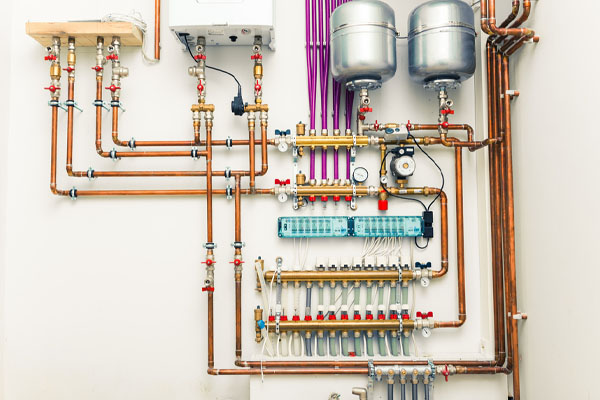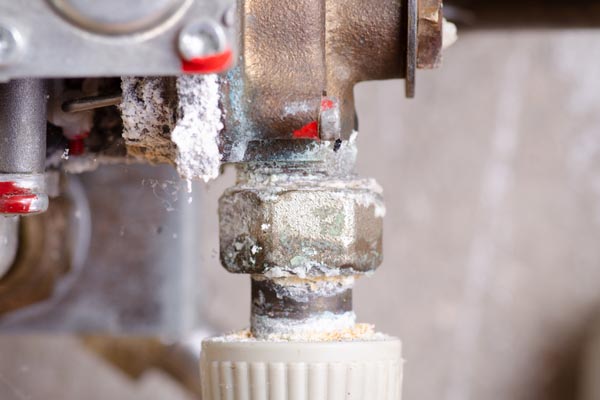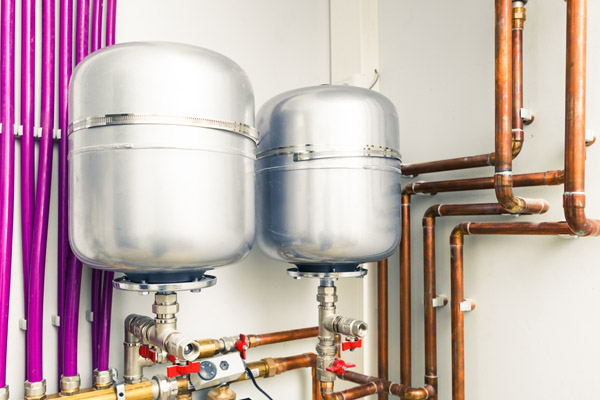Table of Contents
The efficiency of a home heating system greatly depends on a properly working boiler, which ensures warmth and comfort in colder seasons. Yet, a frequent issue that can upset this balance is leaking boilers. Water leaking from boiler not only reduces the system’s effectiveness but also poses safety and maintenance challenges. We’ll explore the different reasons behind boiler leaks in this article, offering clarity on the matter and outlining measures to fix and prevent water leakage from boilers.
5 Reasons Your Boiler Is Leaking
1. Boiler Pressure Valve Problems

The pressure relief valve in a boiler is crucial for preventing over-pressurization by releasing excess pressure. This valve opens to discharge water or steam when the internal pressure exceeds safe limits, ensuring the pressure remains within a safe range.
Leaks from the pressure relief valve can stem from various issues, including excessive pressure buildup. This often happens if the expansion tank malfunctions and fails to accommodate the expansion of water as it heats, leading to increased pressure. Other causes might be sediment accumulation, a faulty valve, or incorrect installation.
Neglecting issues with the pressure relief valve is a significant safety hazard. A faulty valve can cause abrupt releases of hot steam or pressure, potentially damaging the boiler and nearby areas, causing scalding injuries, property damage, or in extreme cases, boiler explosions. Thus, regular checks, proper maintenance, and immediate attention to any valve issues are vital for safe and efficient boiler functioning.
2. Corroded or Damaged Boiler Pipes
Pipes are essential for distributing water and steam throughout a heating system, transporting it from the boiler to radiators or baseboard heaters. However, they are prone to corrosion and damage over time.
The corrosion of boiler pipes can be due to several factors, such as the age of the pipes, the water quality circulating through them, and chemical reactions within the system. Constant exposure to high temperatures and pressure can cause pipes to deteriorate, leading to rust or scale formation. Water quality issues like high mineral or acidity levels can hasten this process. Additionally, chemical interactions between the pipe materials and water additives can also lead to corrosion.
When pipes corrode, they weaken structurally, becoming more susceptible to leaks. These leaks not only cause water wastage and reduce boiler efficiency but also damage surrounding areas. Corrosion buildup inside the pipes can narrow them, impeding the flow of water or steam and thus reducing heat distribution throughout the system.
3. Faulty Boiler Seals and Gaskets

Seals and gaskets in a boiler are designed to ensure a watertight and airtight connection between various components, preventing leaks of water and steam.
The failure of seals and gaskets typically results from normal wear and tear, exposure to high temperatures, and contact with chemicals or minerals in the water. This can cause:
- Deterioration
- Loss of flexibility
- Brittleness
- Increased susceptibility to failure
- Degradation
- Buildup of deposits
- Accelerated wear or failure
When seals and gaskets leak, it affects the boiler’s performance and energy efficiency. Failed components allow water or steam to escape, leading to water loss and a drop in system pressure. This forces the boiler to work harder to maintain temperature and pressure, resulting in higher energy consumption and reduced efficiency. Additionally, leaking seals and gaskets can permit air contaminants into the system, further impairing its operation.
4. Boiler Expansion Tank Issues

The expansion tank in a boiler is crucial for managing pressure changes, accommodating the expansion and contraction of water as it heats and cools. Problems such as a waterlogged tank due to a damaged bladder or diaphragm, faulty air valves, or insufficient maintenance can cause:
- Excessive pressure
- Water leaks
Incorrect air pressure in the tank can lead to inadequate pressure relief, posing safety risks and affecting the boiler’s performance and efficiency.
5. Corroded Boiler Heat Exchanger
The heat exchanger in a boiler transfers heat from the combustion chamber to the water, which is then circulated through the heating system. Corrosion of the heat exchanger can occur due to water chemistry and mineral buildup. Corrosion can lead to water leaks or the release of dangerous gases like carbon monoxide into the system, compromising both the efficiency of the boiler and posing significant health and safety risks.
Signs of a Boiler Leak

Homeowners need to be aware of various signs that indicate a boiler leak. These include:
- Water puddles or drips near the boiler.
- Water stains or discoloration on walls or ceilings close to the boiler.
- A noticeable drop in system pressure.
Addressing these signs promptly is essential to prevent further damage and consequences. Neglecting a boiler leak can result in:
- More extensive damage.
- Reduced efficiency.
- Safety hazards.
- Mold growth.
- Electrical problems.
If you suspect a boiler leak, it’s important to take immediate action, such as contacting a professional technician for assessment and repair.
Boiler Prevention and Maintenance

How to Prevent Boiler Leaks
- Schedule yearly professional boiler inspections.
- Maintain proper water chemistry, and use additives as necessary.
- Promptly repair any corroded or damaged pipes.
- Ensure the pressure relief valve functions correctly.
- Insulate pipes and the boiler in colder climates to avert freeze-related problems.
- Regularly check seals, gaskets, and expansion tanks for wear or damage.
Importance of Professional Boiler Inspections and Maintenance Services
- Certified technicians can spot and address potential issues before they cause leaks.
- Professionals ensure the boiler is cleaned and tuned for peak efficiency.
- Expert servicing ensures safety and adherence to regulations.
Steps Homeowners Can Take for Proper Boiler Operation and Leak Prevention
- Regularly check boiler pressure and temperature.
- Be alert to unusual noises or odors.
- Immediately contact an HVAC expert upon noticing signs of trouble.
- Follow the manufacturer’s maintenance, operation, and safety instructions.
- Keep the boiler area tidy and ventilated.
- Consider a preventive maintenance agreement with a reliable service provider.
DIY vs. Professional Boiler Repairs
Choosing professional HVAC technicians over DIY methods is crucial for boiler leak repairs. DIY repair attempts can lead to safety risks, further damage due to lack of expertise, and non-compliance with safety standards. On the other hand, professional technicians offer extensive experience, specialized tools, and a thorough understanding of safety codes. Their expertise ensures accurate diagnosis and repairs, adherence to regulations, and reduced safety risks, making professional services the safest and most effective option for boiler leak issues.
Conclusion
Boiler leaks can arise from various issues like pressure valve problems, corroded pipes, faulty seals and gaskets, expansion tank issues, and heat exchanger corrosion. Recognizing and promptly addressing these signs is critical to prevent further damage and safety risks.
For repairs and regular maintenance, seeking professional assistance is advised. HVAC technicians possess the necessary skills and tools to accurately diagnose and resolve boiler issues while ensuring safety and efficiency. To maintain your home’s heating and comfort, it’s important to act quickly and seek professional help.
Call County Line Fuel For Superior Home Comfort Solutions

County Line Fuel is your go-to heating oil delivery company, servicing Clinton, NJ and the surrounding areas. With our commitment to providing excellent products and services, you can trust us to meet all your heating needs. We offer the most competitive heating oil prices in the area, ensuring you get the best value for your money.
When you choose County Line Fuel as your oil supplier, you can count on accurate and prompt heating oil deliveries at affordable prices. Our various heating oil delivery plans and financing options allow you to customize your oil deliveries to suit your specific preferences. We take pride in making heating your home hassle-free and cost-effective. Click the link to get started.
Our preferred HVAC service partners have certified and highly trained HVAC technicians who are ready to cater to all your heating and cooling needs. With their expertise and knowledge, they can handle installations, repairs, maintenance, and more. Our superior HVAC solutions are designed to keep your home comfortable all year round without breaking the bank.
At County Line Fuel, customer satisfaction is our priority. We strive to deliver outstanding service and reliable solutions tailored to your unique requirements. For more information, contact us today. Experience the comfort and peace of mind that comes with choosing County Line Fuel as your trusted partner for all your home comfort needs. Call now!
You can click here to contact us now or call us at (908) 735-7610 to find out more!
Related Articles:
